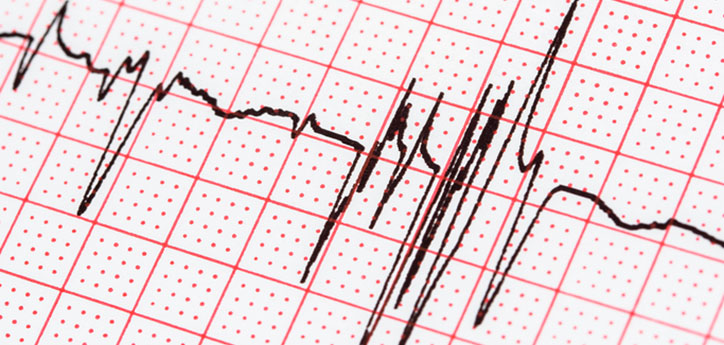Heart disease is the leading cause of death for both men and women in the world according to the Centers for Disease Control and Prevention (CDC). But just like cancer, there are many different types of heart disease. Some prevent blood from flowing freely to and from the heart, while others affect the organ itself. A cardiac arrhythmia is an irregular heartbeat that can cause chest pain, fainting, palpitations, or heart failure. The most common one is called atrial fibrillation.
The dysfunction can be difficult to detect since symptoms are inconsistent and may not appear at all. The only sure way to confirm it is with an electrocardiogram which is typically only ordered for patients who experience severe symptoms.
Most people who suffer from atrial fibrillation complain of rapid heart rate, also called tachycardia. The condition can be extremely serious when a person’s resting heart rate exceeds its normal range. This means the heart is working harder than it should be. Like any other muscle, if the heart is overworked, it will eventually wear down. The strain that is produced by protracted palpitations or tachycardia can occasionally result in angina, heart failure, or stroke. In fact, the risk of stroke can be up to seven times higher for people who suffer from afib.
While it is serious in its own right, atrial fibrillation is often linked to other heart diseases or conditions. There are documented cases where it has occurred in otherwise healthy hearts, but more often than not sufferers also have high blood pressure (hypertension), coronary artery disease, or congenital heart disease. Like most other cardiac issues, the risk of developing AF increases with age. According to the results of a recent study, about 8 percent of octogenarians have the disease. The good news is that it can often be treated without surgery.
AFIB Medications
The older we get, the weaker our hearts get. Like every other organ or muscle, the heart becomes more susceptible to strain or injury, which is why afib patients have a much higher risk of stroke. If their irregularly rapid heartbeat is not slowed, the organ will weaken and shut down. As a result, the primary goals of all afib stroke treatments are to prevent stroke and to promote circulatory stability. These goals can often be achieved with the right combination of over-the-counter and prescription of afib medications.
Anticoagulants
As the name suggest, these drugs prevent coagulation or clotting of the blood, which helps keep arteries open. Depending on their age and their risk of stroke, doctors typically prescribe or recommend aspirin, , or for patients with atrial fibrillation. Older patients often require more expensive and sophisticated prescription meds, while younger ones may be able to manage their condition with aspirin.
Rate Control
Because it is the most serious risk for afib sufferers, afib stroke treatments are often addressed first. But when it comes to managing daily symptoms, doctors must deal with the actual arrhythmia. Chest discomfort, anxiety, palpitations, and difficulty exercising are all common afib symptoms; and the only way that they can be alleviated is to regulate the heart rate. This typically means slowing it down to a rate that is much closer to normal.
The afib medications that are used to control heart rate are far more sophisticated and expensive than those that are used to prevent blood clotting. Most are designed specifically for the management of cardiac arrhythmias and must be prescribed by a doctor. Here is a short list with brief descriptions of the most popular drugs that are used to control heart rhythm and rate.
Beta Blockers
These meds block or at least diminish the effect stress hormones like adrenaline have on the heart. The less stressed out or nervous we are, the less rapidly our hearts will beat. The most popular beta blockers prescribed to patients with afib are atenolol, nebivolol, , and bisoprolol.
Cardioversion
For patients who do not want or cannot afford to take pills for the rest of their lives, there are a few noninvasive afib treatments that may be able to correct their cardiac arrhythmia in short order. As you might expect, electrical cardioversion uses DC electrical shock to restore the organ to its regular, natural heart rhythm and rate. Chemical cardioversion, on the other hand, is completed with drugs, such as dronedarone and propafenone, but they do not have to be taken every day. A short, intense regimen of powerful prescription medications may be enough to correct an irregular heartbeat.
Unless it is ignored, atrial fibrillation is not a deadly disease. With the help of an experienced physician and the right afib treatments, patients can live long, healthy lives.
Featured Image Source: Thinkstock/Radu Bercan
Posted on February 15, 2023



